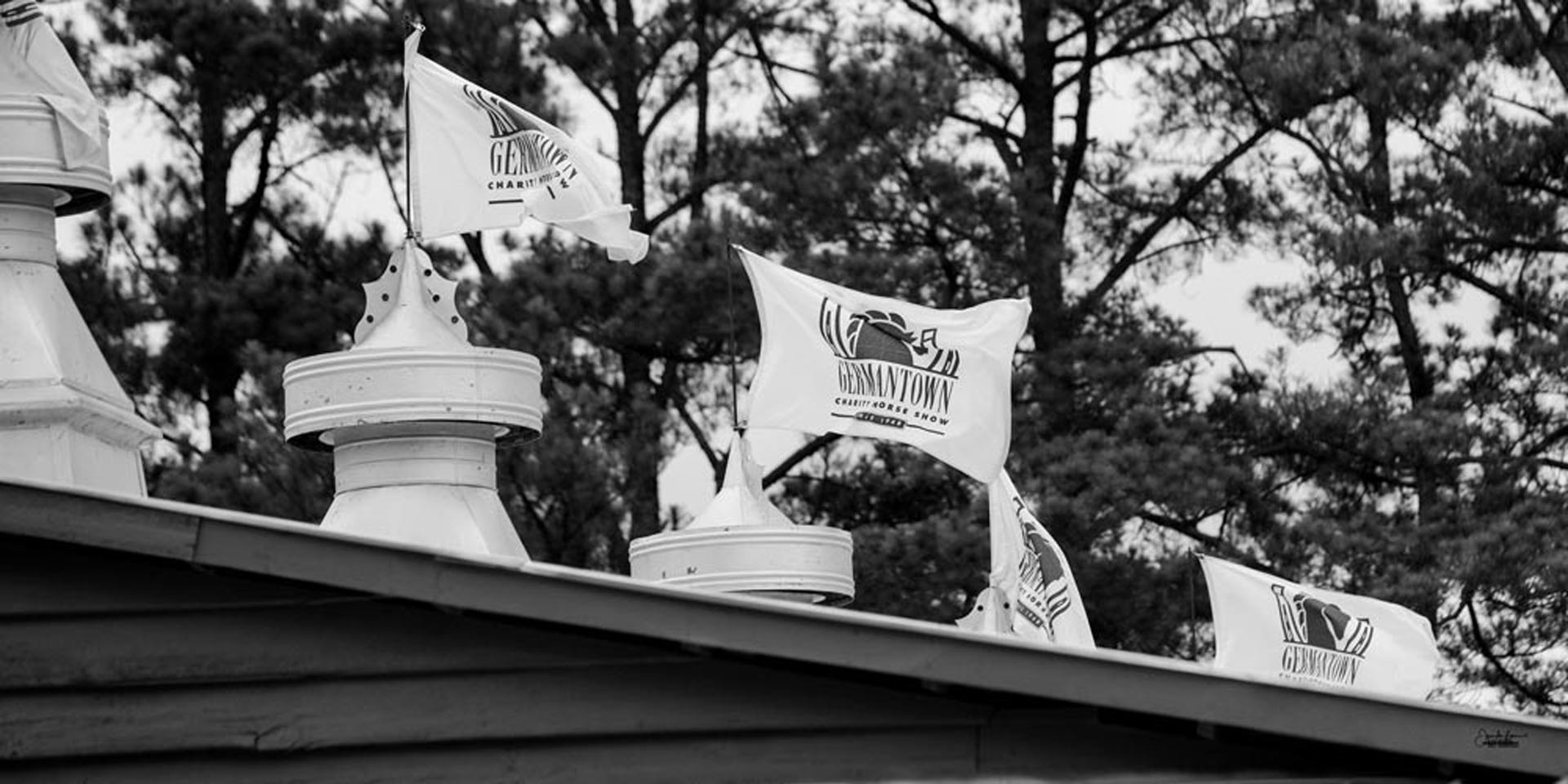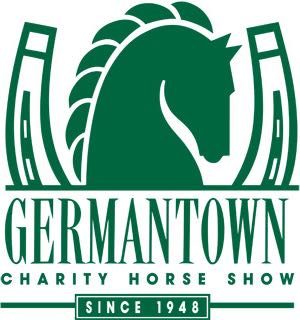
The Story of the Germantown Charity Horse Show
The Germantown Charity Horse Show evolved as most enduring events do: from a dream, a drive, and the dedication of its members. The dream began when a small group of friends, recently returned from active duty in W.W. II, decided that local interest in horses should be channeled into community-wide participation and an extension beyond county lines.
Former Master of Fox Hounds (MFH) Bart Mueller inspired the founding of the local Oak Grove Hunt, which led to the formation of the Germantown Charity Horse Show. Mr. Mueller had experienced fox hunting in Maryland and South Carolina and gave visions of this ancient sport to the neophytes of West Tennessee.
Former MFH Walter N. (Sonny) Foster, Sr. recalls that the Saturday hunts and Sunday afternoon trail rides led to organization of the Oak Grove Saddle Club in 1946. “On Thanksgiving Day of that year, we invited everyone we knew who would like to trail ride to come to a barbecue at the Scout Hut of Germantown School. About 75 people showed up with nearly as many horses. The response sparked the whole idea for a horse show.”
The first Germantown Horse Show was held in 1947 at a new privately-owned show ring and barn located at present-day 7930 Poplar Pike. Three gentlemen from Jackson, Tennessee were invited to manage and participate in the show: Emmet Guy as show manager and announcer, and Jimmy Exum and Haskell Belew as hunter/jumper exhibitors. Out-of-town guests called for hospitality, so a square dance was held in the loft of the barn the night before the show — the first exhibitors’ party. Traditions were being established, and the dream was taking shape.

Three events in 1948 were important to the creation of the horse show as we know it today. Mr. Foster continues: “With the encouragement of Audrey Taylor and Ray Firestone, the LeBonheur Horse Show of Memphis added a Local Working Hunter Class, which drew a number of Germantown entries.
This brought nationwide recognition of the new sport in our community.” In addition, the Oak Grove Saddle Club became the Oak Grove Hunt Club, with Raymond Firestone and Mr. Foster as Joint Masters. Steered by Bart Mueller’s experience, the hunt soon became recognized.
The third event that supported the development of the show was the alliance of the Oak Grove Hunt Club with the Germantown Civic Club. The Civic Club had long been aware of local interest in gaited and walking horses and the two organizations perceived that joining forces would benefit the whole community. Committees from both groups worked together to stage the 1948 horse show at the Ralph B. Hunt Field of M.C. Williams High School in Germantown. The official program stated that proceeds would go to carry on projects of both organizations, and that “a large portion will go to pay for the lights under which this show takes place tonight.”
Local merchants, friends, and many businesses in Memphis placed ads in the 36-page program. Some space was used to explain the sport of fox hunting, to encourage the participation of children, and to welcome exhibitors. One quarter page advertised: “Germantown, Tennessee founded in 1836: 16 miles to Memphis, the Cotton Metropolis of the Americas, a city of 343,000 well satisfied citizenry.”
Ten afternoon classes were designed to appeal to novices and youthful riders. Here the traditional costume class began. Three hunter classes were interspersed as well. The ten evening classes established the all-breed tradition by scheduling classes for hunters, jumpers, three-gaited, five-gaited, fine harness, roadster, and walking horses.
The First Charity
After the conclusion of a very successful 1948 show, the Horse Show Committee from both the Hunt Club and the Civic Club agreed that benefiting a charity would increase public interest and participation. Gailor Hall for Boys (later called Boys Town) was designated as the recipient of proceeds from the 1949 show.
Newspaper accounts from the 1949 show report that 5,000 people were expected at the May 21 evening show and 140 horses from six states were on hand to compete. The show was delayed by rain — another tradition established — but nonetheless it continued and Paul Raines won three blue ribbons.
The delay did not dampen enthusiasm for food and drink and the Civic Club concession stands did such good business that the decision was made to abandon their annual Germantown Carnival in order to concentrate all efforts on concessions for the proposed annual horse show.
By the 1950 show, the Germantown Charity Horse Show Association had been chartered by the state. Oak Grove Hunt Club and the Germantown Civic Club each elected five members to be directors of the Horse Show Association. These ten directors would choose an eleventh member.
Oak Grove Hunt elected W.N. (Sonny) Foster, Sr., Daniel E. West, Winston Cheairs, Gordon Meeks, Jr., and Claude H. McCormick.
Newspaper accounts from the 1949 show report that 5,000 people were expected at the
May 21 evening show and 140 horses from six states were on hand to compete.
Germantown Civic Club elected John R. Stivers, George M. Chapman, Boyd Arthur, Sr., Bill Spangler and Art Hawkinson. Judge F.M. Henderson was elected as the eleventh man.
The 11 directors were already friends and neighbors and many were members of both organizations, so the dream and drive were unified. The extent of the unification is documented in The Huntsman’s Letter of October 5, 1947. A notice read, “Wanta’ Swap? Judge Henderson will get a hunter if someone will buy one of his gaited horses!”
John R. Stivers was elected the first GCHSA President in 1950, and the Memphis Union King’s Daughters sponsored the show for the benefit of the Home for Incurables, a King’s Daughter’s project. “This is truly a community project,” Mr. Stivers said. “Everyone in Germantown has pitched in and tried to make it a success.”
Show manager was Eddie C. Eggert, who for the past four years had managed the American Royal Show in Kansas City. Box seats were installed around the temporary ring with the judges’ stand forming an island in the center.
Author William Faulkner and his family came from Oxford, Mississippi to see the show. In 1951 a three-year contract (was signed) by officers of the Horse Show and the Memphis Union of Kings Daughters to continue their successful partnership.
GCHS Featured on Crosstalk
This episode of Crosstalk, the award-winning show produced by Germantown High School TV was produced during the 2016 Germantown Charity Horse Show. It is a 30-minute in-depth look into the history and organization of our all-breed show and the contribution our event makes to the community.
